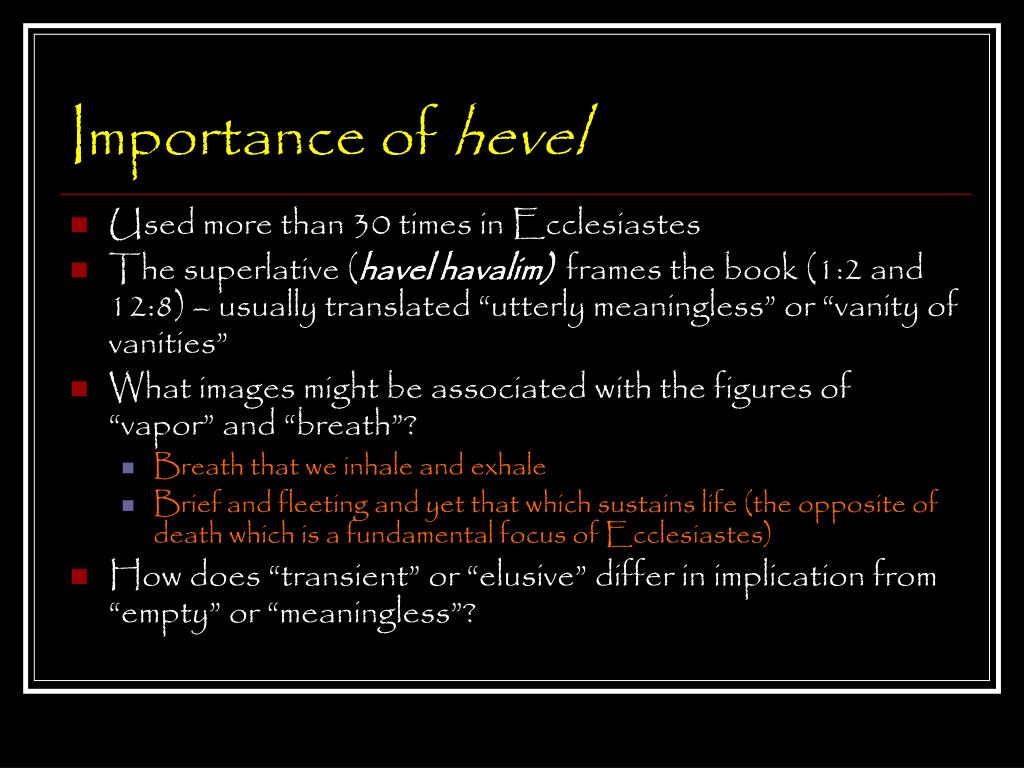Ever heard that famous line from the Bible, “Vanity, vanity, all is vanity”? It’s from Ecclesiastes, and it’s all about how meaningless life can seem. The thing is, that key word, “vanity,” is actually a translation of the Hebrew word hevel (הֶבֶל), and it means a whole lot more than just being vain. Hevel is about breath, vapor, the fleeting nature of things, and chasing meaning where there might not be any. So, let’s dive into what hevel really means – it’s a surprisingly deep and thought-provoking word that might change how you see the world.
The Deeper Meaning of Hevel
Beyond Vanity: Exploring the Nuances
That famous line from Ecclesiastes, “Vanity, vanity, all is vanity,” is often our first introduction to the Hebrew word hevel. But translating it simply as “vanity” probably misses a significant part of its true meaning. Hevel suggests a much richer, more nuanced understanding of life, meaning, and everything in between.
The Fleeting Image of Breath
Imagine your breath on a cold morning. You see it for a moment, a small cloud in the air, and then it’s gone. That image of transience gets to the core of hevel. It speaks to the temporary nature of everything – life, possessions, accomplishments – all eventually fade. While “vanity” captures a part of it, hevel is more about fragility and impermanence. We all experience loss and the relentless march of time; hevel is a constant reminder of that reality.
A Poignant Connection: The Story of Abel
Here’s a thought-provoking connection: Abel, the second son of Adam and Eve, is also named Hevel in Hebrew. His life, tragically cut short by his brother Cain, powerfully illustrates the fragility inherent in hevel. Is this a coincidence, or does Abel’s name foreshadow his fate, highlighting the precariousness of human existence? This connection adds another dimension to the hevel meaning.
Chasing Permanence in a Changing World
Humans often strive for permanence. We build empires, amass wealth, seek recognition – all to leave a lasting mark. But hevel suggests these pursuits, while seemingly important, are ultimately fleeting. It reminds us that we live in a world defined by change, where even the grandest achievements eventually fade. Some scholars argue that true meaning doesn’t lie in chasing permanence, but rather in accepting impermanence. This is a key concept explored further in the section on where is Hevel in the Bible?.
Lost in Translation: Defining Hevel
Even different Bible translations struggle to capture the essence of hevel. It’s rendered as “vanity,” “futility,” “meaningless,” sometimes even “breath” or “vapor.” Each translation grasps a different facet of this complex word. This difficulty reinforces the importance of exploring hevel within its original Hebrew context to understand its true meaning.
Embracing the Ephemeral: Finding Meaning in the Moment
If everything is fleeting, as hevel suggests, does that mean life is meaningless? Not necessarily. Recognizing impermanence might be a source of freedom, not despair. Perhaps hevel invites us to appreciate the present moment, the small joys, the simple things. Maybe true meaning isn’t in what lasts, but in how we experience each fleeting moment.
Where is Hevel in the Bible?
The word “hevel” plays two distinct roles in the Bible: as a person and as a concept. Understanding both is crucial to fully grasping its significance.
Hevel: The Tragic Story of Abel
In Genesis 4, “Hevel” is Abel, the second son of Adam and Eve. Abel’s murder by his brother, Cain, illustrates the fragility of life and the presence of injustice. It is reasonable to conclude that Abel’s fate, whose very name is Hevel, might foreshadow the themes of transience found in Ecclesiastes.
Hevel: Beyond Vanity in Ecclesiastes
In Ecclesiastes, “hevel” (הֶבֶל) appears 38 times, not as a person, but as a recurring theme. Often translated as “vanity,” it speaks to the ephemeral nature of things, evoking images of breath or vapor. It suggests that our pursuits, like grasping at wind, may offer only fleeting satisfaction. Explore this further in the section on how many times is Hevel in Ecclesiastes.
Chasing the Wind: Hevel in Ecclesiastes
Ecclesiastes, traditionally attributed to King Solomon, uses “hevel” to explore the human experience. Solomon, having experimented with every earthly pursuit, finds them ultimately unsatisfying. He likens this to chasing the wind – a futile endeavor. This could be seen as a realistic assessment of life’s limitations, encouraging us to question our priorities and what truly holds value.
Finding Meaning in the Fleeting: A Different Perspective
While “Vanity of vanities, all is vanity,” might sound pessimistic, “hevel” might not be about the absence of meaning, but rather its elusive nature. Perhaps it encourages us to find joy in the present moment, in simple things, and genuine connections, rather than chasing fleeting possessions.
| Hevel as a Person (Genesis) | Hevel as a Concept (Ecclesiastes) |
|---|---|
| Abel, the murdered brother | Vanity, emptiness, fleetingness |
| Represents injustice, fragility of life | Represents the transient nature of earthly pursuits |
| A specific event | A recurring theme |
| Sets a tragic tone early in the Bible | Prompts reflection on the meaning of life |
Ultimately, “hevel” invites personal interpretation. What does it mean to you? What does it say about your search for meaning?
What does the name Hevel mean?
“Hevel” (הֶבֶל) is a multifaceted word rich with meaning. Let’s unpack its various layers.
Key Takeaways:
- Hevel translates to “breath,” “vapor,” signifying life’s temporary nature.
- Hevel is Abel’s name, adding a poignant layer to its meaning.
- Ecclesiastes uses hevel to express the futility of chasing worldly pursuits.
- Exploring “hevel” encourages reflection on life’s fragility and our search for meaning.
- A possible Assyrian link to “meadow” offers another dimension to its meaning.
A Symbol of Transience
Imagine holding sand; it slips away the moment you open your hand. This captures hevel‘s essence—a metaphor for everything temporary, everything that fades. It’s not just “breath,” but a representation of transience.
The Tragic Story of Abel
Hevel is not just a concept; it’s Abel’s name. His story in Genesis 4, adds a layer of sadness. Abel’s untimely death embodies hevel, reminding us of life’s fragility.
Hevel in Ecclesiastes: The Emptiness of Pursuit
In Ecclesiastes, hevel becomes a pervasive feeling of emptiness. “Vanity of vanities, all is vanity!” This emptiness comes from chasing ultimately unsatisfying pursuits. Have you ever chased something relentlessly, only to find it unfulfilling? That, too, is hevel.
The Assyrian Meadow: Another Layer
Some believe hevel might also derive from the Assyrian word for “meadow.” A meadow is vibrant, yet subject to seasonal change – it flourishes, then fades. This adds another layer to hevel, suggesting not just emptiness, but the cyclical nature of life, growth, decay, and renewal.
Finding Meaning Amidst Hevel
Understanding hevel prompts reflection on life, existence, and meaning. Perhaps, acknowledging hevel, recognizing the ephemeral, allows us to appreciate the present moment, the simple joys, and the connections we make. It encourages us to ask: “What truly matters, knowing that everything is temporary?”
How many times is Hevel in Ecclesiastes?
“Hevel” (הֶבֶל) appears 38 times in Ecclesiastes, suggesting its importance to the author’s message. Often translated as “vanity,” its literal meaning, “breath,” “vapor,” or “smoke,” captures the book’s central theme: life’s transient nature. Solomon uses “hevel” to paint a picture of earthly life as ultimately fading away. For more on the meaning of hevel, see the section on what does the name Hevel mean?.
Solomon, in his supposed wisdom, seems to say much of what we pursue – possessions, achievements, even life itself – is like a fleeting breath. He finds much of it to be hevel – empty, fleeting.
Ecclesiastes wrestles with meaning from an earthly viewpoint (“under the sun”), where everything fades. This perspective can make life appear meaningless. But does acknowledging ephemerality necessitate despair? Or could it encourage a search for more enduring meaning, something transcending the temporary?
Some believe Solomon’s use of “hevel” isn’t meant to cause despair, but to be a wake-up call. It confronts us with life’s transience, prompting deeper reflection. If everything fades, where do we find true meaning and purpose? This central question resonates with us today. Perhaps grappling with hevel is the first step towards uncovering enduring answers.
Ecclesiastes, while highlighting life’s transient nature, exists within a larger biblical narrative offering hope and eternal purpose through faith. This broader context is crucial when exploring Ecclesiastes.
| Word | Count in Ecclesiastes | Meaning |
|---|---|---|
| Hevel (הֶבֶל) | 38 | breath, vapor, vanity, futility |
Much remains to be explored regarding “hevel.” Ongoing research may further refine our understanding. However, its presence in Ecclesiastes powerfully reminds us of life’s fleeting nature “under the sun” and encourages us to seek meaning beyond the temporary. Are you struggling with another puzzling clue? You might find the answer you’re looking for in our resource on the hair ripping beautician crossword clue.












